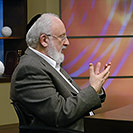Audio Version Of The Blog – 5/27/24
Listen to an Audio Version of the Blog
Download:MP3Audio

Listen to an Audio Version of the Blog
Download:MP3Audio
 Question: It is written in the sources that we fill the void between us with the greatness of the Creator. What is this empty space?
Question: It is written in the sources that we fill the void between us with the greatness of the Creator. What is this empty space?
Answer: We fill such voids in our hearts where we previously felt nothing and never thought that there was something there with the greatness of the Creator.
The Creator grants us the opportunity to fill the empty space by the property of bestowal.
Question: Is it necessary to maintain material emptiness, that is, the desire to be content with only what is necessary in order to correctly realize spiritual emptiness?
Answer: You need to be in balance. A person must have both. One must calmly work with all one’s desires.
[329181]
From the Daily Kabbalah Lesson 5/10/24, Writings of Baal HaSulam “A Pomegranate”
Related Material:
A Hole In The Soul The Size Of The Creator
Where Is God?
There Is Nothing Worse Than Emptiness
 Question: We must learn how to use our receiving Kelim for bestowal, but in fact we are the ones who get corrected. In this case, how should we deal with shame?
Question: We must learn how to use our receiving Kelim for bestowal, but in fact we are the ones who get corrected. In this case, how should we deal with shame?
Answer: Shame is a good quality. It corrects us and gradually turns us in a way that we stop receiving for our own sake.
Question: For me, the Creator is so great that for His sake I am ready to bestow to everyone. But at the same time, I no longer want His revelation.
On the contrary, I am ashamed if He reveals Himself. I want to hide before Him because He is so great in my eyes. What is this faith called?
Answer: It is called simple faith; when you do not desire anything other than all the opportunities that the Creator gives you to help others, to support and encourage them.
[329166]
From the Daily Kabbalah Lesson 5/11/24, Writings of Rabash “The Reason for the Faith”
Related Material:
Shame Is a Separate Creation of the Creator
Shame Is A Beneficial Quality
Spiritual Shame
 Question: Among your students, there are certain layers: the so-called “light cavalry” and the “core.” Each occupies their own place, and no one should replace anyone else. But how can a person determine their place?
Question: Among your students, there are certain layers: the so-called “light cavalry” and the “core.” Each occupies their own place, and no one should replace anyone else. But how can a person determine their place?
Answer: They determine it themselves. In the process of studying, everyone finds their place.
It is like, for example, balls floating in a thick layer of liquid, where each ball occupies a certain place according to its specific gravity, density, and the density of the liquid. One floats on the surface, another closer to the bottom, and so on. Similarly, the students are distributed according to the properties, qualities of their desire, and intention.
And none of them interfere with each other. They are all in a relatively suspended state: above is the Creator, below is our world, and they are in between these two boundaries. Therefore, it depends on each individual at what level they will hang in this thickness. Just as when a hot air balloon is heated, it rises, and when it cools down, it descends.
Comment: But every person by nature wants to be the best.
My Response: Yes, that’s true. But the thing is, they must work against their egoism, and that’s not so simple. Not everyone can be the best. To achieve that, one must apply a lot of effort directed against oneself.
Question: Still, everyone wants to become a great Kabbalist. But does it depend not on the person, but on their properties?
Answer: Yes and no. Even throughout history, there have been Kabbalists who initially had very few abilities for this.
We’re not talking about such great Kabbalists as the Ari. They are special souls placed from above as cornerstones on the common path of humanity.
But if we’re talking simply about a person, here there are absolutely no limitations for anyone.
[328675]
From KabTV’s “I Got a Call. How to Find Yourself?” 1/27/12
Related Material:
Everyone Moves along Their Own Vector
Win Your Place
The Train Won’t Wait!
 Happy is he who, amid torments,
Happy is he who, amid torments,
Amid anxieties and life’s noisy passions,
Like a rose that blooms thoughtlessly,
And lighter than a shadow running on water (Anna Akhmatova).
Question: Do you agree that we walk amid torments and anxieties? Is life like that?
Answer: Probably. Yes.
Comment: Second, she says that happy is he who like a rose blooms thoughtlessly.
My Response: In general, yes. Just as the laws of nature push it to develop, so it grows.
Question: Just as a rose grows according to nature, should a person also grow?
Answer: Yes.
Question: Similar to what should we grow?
Answer: Similar to nature. This means that by studying nature, we should discover capabilities within ourselves to mimic it.
Question: But everything in nature is built on instincts, and we are rational beings.
Answer: And we should do this rationally. It is very, very difficult. But that is exactly what we should do.
Question: So, we see how nature submits to universal harmony, and we with our reason should submit to it?
Answer: Yes.
Question: What do I need to do with my mind that tells me that I have my “self,” my opinions, and so on?
Answer: Nullify all of that as much as possible.
Question: And is this the path to happiness if I can nullify it?
Answer: Yes.
Question: Anna Akhmatova says that one should live lightly. She writes: “To live like a shadow running on water.” That is, you do not turn the water back; you are like a shadow running on water. In your opinion, is it by nature?
Answer: A person should resemble a shadow running on water, but at the same time, they must understand that it requires working on oneself.
Question: And again, we come back to the same thing—to annulment?
Answer: Yes.
Question: What is this rule that is so difficult for us to fulfill?
Answer: Egoism must be annulled!
Comment: It is so hard! So hard to take this step!
My Response: The main thing is not to forget.
Question: Then what is the purpose of my “self”?
Answer: Precisely to annul it.
Question: I am talented in something, I am successful, I know that my opinion is correct. What should I do about it?
Answer: You need to dig all of that out. Like using a knife to dig out the rotten part from an apple and discard it.
Question: Is my protruding “self” the rotten part?
Answer: Yes.
Question: What will remain then?
Answer: Something good, fit for life.
Question: What about my opinion? What should I do with it?
Answer: If it remains after such a transformation, then you will live with it.
Question: What is my “self” given to me for? It turns out it is given to me precisely so that I can…
Answer: So that you can annul it and instead find in the surrounding world, in nature, such forces that together would enable you to create yourself similar to nature, similar to the Creator. That is the main thing.
Question: In which case can a person consider their life happy?
Answer: I think a person can consider himself happy if he takes a step forward toward the universal, unified nature, and integrates into it as an integral whole.
Question: How do you personally evaluate your life? As happy?
Answer: I evaluate my life, overall, as happy. I have searched a lot and spent a lot of time testing myself—what and how. I have not reached the highest category of my searches. But I am happy that I still found out where the truth is and how to approach it. We will continue with the rest.
[327429]
From KabTV’s “News with Dr. Michael Laitman” 3/18/24
Related Material:
Life Is a Moment
How to Enjoy Life?
Enjoy Life Here And Now!
 Question: From the egoistic point of view, it seems wrong that building a connection with the Creator and afterward with our friends is easier than the other way around. How do you really build connection?
Question: From the egoistic point of view, it seems wrong that building a connection with the Creator and afterward with our friends is easier than the other way around. How do you really build connection?
Answer: Building connection correctly means constantly inspiring your friends to reach a higher state together with them.
Question: So the connection is built with the Creator first?
Answer: There is no need to build anything with the Creator. With the Creator, everything will work out for you anyway. The main thing is to connect with the friends.
Question: The primary sources state that one needs to ask for the Creator’s help. If I ask for help from my friends, does it replace appealing to the Creator?
Answer: Those are not the same thing, but one does not interfere with the other.
[329174]
From the Daily Kabbalah Lesson 5/10/24, Writings of Baal HaSulam “A Pomegranate”
Related Material:
The Force Leading to the Creator
Let’s Turn the World to Goodness
During these Difficult Days
 Question: Although we speak the same language, your words carry a whole new layer when you explain things. That is, your explanation in no way matches my understanding. There is a barrier: you are trying to convey—I am trying to understand.
Question: Although we speak the same language, your words carry a whole new layer when you explain things. That is, your explanation in no way matches my understanding. There is a barrier: you are trying to convey—I am trying to understand.
There is a concrete layer between us. How can I understand why we have such a difference in perception?
Answer: Because we work on different frequencies. Definitions I exist in, you do not. There is no need to talk about it, complain, or suffer from it.
At your level, you will not understand me like a child and his parents. So what? The child will grow up and understand. He should try to grasp what they are showing him according to his level. And that is enough!
There is nothing you can do. I do not suffer because many people do not understand what I want to convey. Everyone has their own goal and guiding light; therefore, everyone will grasp it in due time. I teach and give general education. Later, each person seeks and develops himself further based on the characteristics of his soul.
[328566]
From KabTV’s “I Got a Call. One Word – a Million Meanings” 1/8/12
Related Material:
Communication on the Same Level
Following The Teacher Who Sees The Way
The Connection Between Teacher And Student
 Question: When people get intoxicated from the “wine of Torah,” can they lose the desire to purify themselves?
Question: When people get intoxicated from the “wine of Torah,” can they lose the desire to purify themselves?
Answer: No. It is a special kind of intoxication. It elevates degree by degree.
Question: In the article “Who Comes to Purify,” Baal HaSulam talks about two states: the state of coming and the state of coming and going. What is the difference?
Answer: The difference is that a person comes with a problem and leaves with a gift.
Question: How does a constant prayer correctly combine with joy?
Answer: Joy in prayer, prayer in joy. There are no contradictions between them.
Question: How can one reach the attribute of “the one who came to purify” and stand before the Creator?
Answer: The most important thing is to study the sources, try to feel each article, and then you will be able to present yourself to the Creator.
[328998]
From the Daily Kabbalah Lesson 5/7/24, Writings of Baal HaSulam “Who Comes to Purify”
Related Material:
Questions about Spiritual Work—124
Questions about Spiritual Work—123
Questions about Spiritual Work—122
 Everyone should examine himself and see how much effort he is giving to the society (Rabash, Article No. 17, Part 2, 1984, “The Agenda of the Assembly”).
Everyone should examine himself and see how much effort he is giving to the society (Rabash, Article No. 17, Part 2, 1984, “The Agenda of the Assembly”).
Question: How can we check for this? You can see on the outside that everyone is doing some work that depends on their character qualities, abilities, and free time. But how can you check one’s inner work, one’s thoughts?
Answer: Yes, you can still check the level of care one has before the gathering. One is ready to spend time, effort, and intention for friends to feel like a necessary condition that rightly influences him and helps everyone come into one unified whole.
Question: But how can he check this?
Answer: Only based on his feelings.
Comment: But this is not objective, feelings are subjective.
Answer: What can he do? That is all he and each of his friends have. As a result, when they gather together, they should talk about it, see how much they strive to connect, and how important each person is to everyone.
[327774]
From KabTV’s “Practical Kabbalah” 4/4/24
Related Material:
Examining My Inclusion In The Environment
Constant Examination
Allergic To Love
 Comment: According to Kabbalah, everything consists of 613 desires. Every element that I see consists of different combinatorics of 613 desires.
Comment: According to Kabbalah, everything consists of 613 desires. Every element that I see consists of different combinatorics of 613 desires.
My Response: Not just any object, but a person! Every human consists of a combination of 613 desires. We don’t talk about anyone besides him because all the inanimate, vegetative, and animal elements that seem to exist outside of us are also our desires.
Question: How, for example, can a stone be viewed in relation to our desires?
Answer: Very simply, my desire of the inanimate level draws such an object to me, and evokes in me the feeling of this object.
Question: That is, a stone is, in principle, one desire?
Answer: No, it is the sum of my 613 desires, which are currently at the inanimate level of development and appear to me in this form. The combination of various partial vectors adds up to a vector of such a level designated as a stone in me.
For example, behind the image on your computer screen, there are also vectors.
Now you see me on the monitor and then in your head. In the same way, the picture of the world is drawn by vectors in our heads. What about the monitor? The monitor (screen) is inside us, but we don’t feel it; it seems as if everything happens outside.
And why was this done, this “outside” orientation? Mainly so that we can work with our egoism until this supposedly external vision becomes our internal one.
[328680]
From KabTV’s “I Got a Call. The World as We Don’t Know It” 1/12/12
Related Material:
My World Is A Collection Of Desires
The Whole World Is Inside Us
The Entire World Is Inside Us